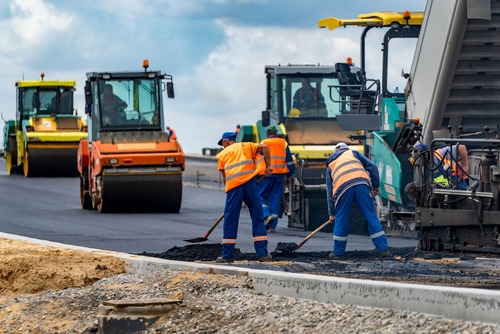
There are constructive ways to pay for upgrading the nation’s infrastructure, according to a newly released bipartisan report from the congressional Problem Solvers Caucus.
The 16-page report released Jan. 10 — coming out ahead of President Donald Trump’s much-anticipated plan on the same topic — cites myriad policy solutions for improving U.S. roads, highways, bridges, the power grid, and broadband and communications networks, as well as transportation, energy, and water and sewer systems.
“By modernizing existing user fees, incentivizing private innovation and investment through public-private partnerships, making smarter investments with limited federal dollars, and increasing accountability to taxpayers, this taskforce believes we can build a 21st Century infrastructure network that will foster a truly 21st Century economy,” according to the Problem Solvers Caucus Infrastructure Working Group’s Rebuilding America’s Infrastructure report.
The working group’s members are U.S. Reps. John Katko (R-NY) and Elizabeth Esty (D-CT), who are co-chairmen of the caucus, and Reps. John Faso (R-NY), Daniel Lipinski (D-IL), Jacky Rosen (D-NV), Lloyd Smucker (R-PA), Thomas Suozzi (D-NY), and Peter Welch (D-VT).
The group’s recommendations are critical, the lawmakers write in the report’s executive summary, because after years of “underinvestment and deferred maintenance,” America’s infrastructure has fallen behind what exists in other countries.
“By some estimates, the funding gap may be as high as $2 trillion by 2025 across all sectors of American infrastructure,” the members write.
The Infrastructure Working Group met with more than 100 outside stakeholder organizations, the Trump administration and leaders in Congress to develop the report’s bipartisan concepts in efforts “to move an infrastructure plan forward,” according to a statement from Rep. Katko’s office.
“I was proud to work in a bipartisan manner with Rep. Esty and members of the Problem Solvers Infrastructure Working Group to produce a comprehensive report detailing areas in which we can begin to work together to streamline processes and provide sustainable funding solutions,” Katko said in the Jan. 10 statement.
“In doing so, we’ve signaled to President Trump, as well as leaders on both sides of the aisle in the House and Senate, that we are ready to work in a bipartisan manner to move our nation’s infrastructure forward,” the New York congressman said.
White House officials told senators on Jan. 9 that Trump’s infrastructure package plan likely won’t be released until February after the president delivers his State of the Union address on Jan. 30. The administration had promised an early January release, but other Republican priorities apparently took control of the calendar.
President Trump previously has said the package will prioritize $1 trillion worth of national infrastructure investments and reduce the construction permit process to two years.
Earlier investments in America’s infrastructure are what have helped make the country great, Rep. Esty said in a statement this week.
“Those investments created millions of jobs, led to unprecedented mobility and innovation, and established America as the envy of the world,” Esty said. “Today, millions of Americans see aging airports and rightly wonder if we’re still capable of tackling the toughest challenges our country faces in a bold, bipartisan manner.”
Among many solutions recommended by the caucus working group, likely the most controversial include those related to general funding and financing reforms.
One suggestion is that Congress provide stable, long-term sustainable infrastructure funding. Another is to preserve and expand tax-advantaged infrastructure financing options. This would be done, for example, by keeping the federal tax-exempt status for municipal bonds and private activity bonds, according to the report.
One more funding-related idea from the group is to incentivize states to adopt and establish public private partnership (P3) legislation and project evaluation units.
“While private sector participation alone cannot close the infrastructure gap, giving states and local governments flexibility in using P3s will provide them with an additional tool in their toolbox,” the report notes.
And the more funding tools available, the better, say Republicans who are leery of the Trump administration’s consideration of a proposed increase to the federal gasoline tax to fund the president’s infrastructure package.
“Under no circumstance can we increase gas taxes or tolls — or any taxes for that matter,” said U.S. Rep. Josh Gottheimer (D-NJ) this week, who serves as a member of the House Financial Services Committee.
Democrats support the gas tax idea as a way to pump up the near-empty Highway Trust Fund, which allots funding for a variety of U.S. transportation projects. Currently, the fund is financed by a federal fuel tax of 18.4 cents per gallon of gas and 24.4 cents per gallon of diesel. The taxes have not changed since 1993 and the Highway Trust Fund is expected to dry up in 2020.
Reps. Gottheimer and Tom Reed (R-NY), who serve as co-chairman of the 48-member Problem Solvers Caucus, launched the Infrastructure Working Group to find consensus for a bipartisan set of policies to help solve such issues.
“We have a great group of members willing to work across the aisle on this issue #TimeForInfrastructure,” Rep. Reed posted in a Jan. 10 tweet. “Great work from the Problem Solvers Caucus and our efforts to introduce a bipartisan infrastructure plan.”
Regarding aviation, one of many related topics covered in the report, the caucus working group noted that U.S. airports carry more than 932 million passengers a year and move roughly a quarter of the country’s imports and exports.
“Yet Congress has not empowered our airports and air traffic control systems to keep up with growing demand,” according to the report.
In its single recommendation, the working group said that Congress “should proceed to debate a bipartisan, long-term reauthorization of the Federal Aviation Administration.”